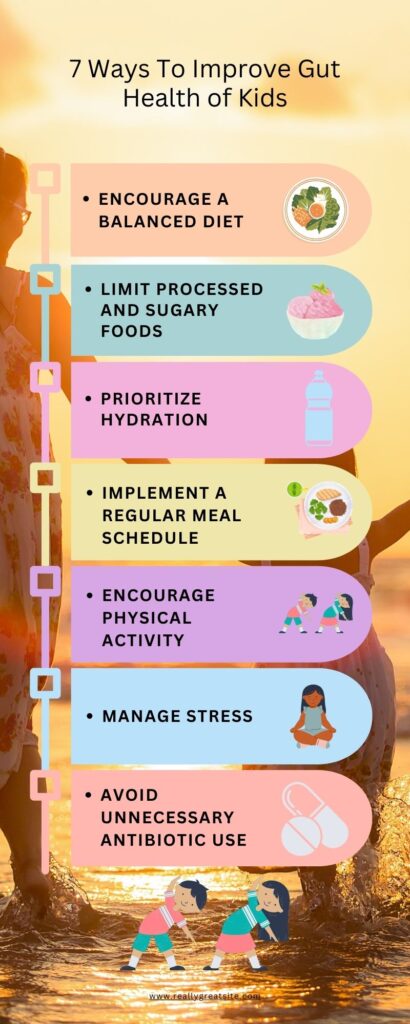Good gut health is essential for everyone, but even more critical for children who are still developing. A healthy gut not only helps with digestion but also supports a robust immune system, helps absorb nutrients, and even affects mood and behavior. You can follow these seven effective ways to improve and maintain your child’s gut health.

Encourage a Balanced Diet
One of the most important factors in ensuring good gut health for kids is their diet. A balanced diet that includes a variety of whole foods can greatly benefit their gut microbiome. Fiber-rich foods like fruits, vegetables, whole grains, and legumes are essential for promoting a diverse and healthy gut microbiota. These foods provide the necessary prebiotics that feed beneficial gut bacteria, leading to a balanced gut environment.
Additionally, including fermented foods in their diet, such as yogurt, kefir, and sauerkraut, can introduce beneficial probiotics. Probiotics are live microorganisms that help maintain a harmonious balance of bacteria in the gut. They can improve digestion, boost the immune system, and reduce the risk of gastrointestinal issues.
Limit Processed and Sugary Foods
Processed and sugary foods can have a detrimental impact on your child’s gut health. Excessive consumption of sugar and processed foods can disrupt the balance of bacteria in the gut and lead to an overgrowth of harmful microorganisms. This imbalance can result in various health issues, including digestive problems, obesity, and weakened immunity.
To maintain a healthy gut, it’s crucial to limit the intake of these foods and opt for natural, whole-food alternatives. High-sugar snacks and beverages should be replaced with healthier options like fresh fruits, nuts, and water. Reducing the consumption of processed foods that are high in artificial additives, preservatives, and unhealthy fats can help preserve the delicate balance of the gut microbiome.
Prioritize Hydration
Proper hydration is essential for overall health, and it also plays a significant role in maintaining a healthy gut. Dehydration can lead to constipation and disrupt the normal functioning of the digestive system. Encourage your child to drink an adequate amount of water throughout the day to keep their gut in optimal condition.
Water helps in softening stools and promoting regular bowel movements. You can also include water-rich foods like cucumbers, watermelon, and oranges in their diet to ensure they stay hydrated. Avoid excessive consumption of sugary or caffeinated beverages, as they can have a dehydrating effect.
Implement a Regular Meal Schedule
Consistency in meal timing is another crucial aspect of maintaining good gut health in kids. Establishing a regular meal schedule helps the digestive system function at its best. When children eat at consistent times each day, their bodies become accustomed to the routine, and digestive processes work more efficiently.
Moreover, meal regularity can prevent overeating and reduce the chances of consuming unhealthy snacks between meals. Ensure that your child has a well-balanced breakfast, lunch, and dinner at approximately the same times each day. Incorporate healthy snacks when needed, but try to avoid excessive snacking that may disrupt their meal schedule.
Encourage Physical Activity
Physical activity is not only important for a child’s overall health but also for their gut health. Regular exercise can stimulate the movement of food through the digestive system, preventing constipation and other gastrointestinal issues. Additionally, exercise has been linked to a more diverse and balanced gut microbiota.
Encourage your child to engage in age-appropriate physical activities and sports. Limit their screen time and promote outdoor play and exploration. These habits not only promote good gut health but also contribute to their overall well-being.
Manage Stress
Believe it or not, stress can have a significant impact on the gut health of kids. Stress can lead to changes in gut motility, blood flow, and the composition of the gut microbiota. It can result in digestive discomfort, such as stomachaches and diarrhea. To promote a healthy gut, it’s important to help your child manage stress effectively.
Teach your child stress-reduction techniques like deep breathing, mindfulness, or meditation. Encourage open communication and create a supportive environment where your child feels comfortable discussing their feelings and concerns. Reducing stress can help maintain a balanced gut and a healthy mind.
Avoid Unnecessary Antibiotic Use
While antibiotics are important for treating bacterial infections, they can also disrupt the balance of the gut microbiome by killing both harmful and beneficial bacteria. Excessive or unnecessary antibiotic use can have long-lasting effects on a child’s gut health.
To safeguard your child’s gut health, avoid requesting antibiotics for viral infections, such as the common cold, where antibiotics are ineffective. Additionally, if your child does need antibiotics, make sure they complete the full course as prescribed by the healthcare provider. After a course of antibiotics, consider incorporating probiotics into their diet or discussing the use of probiotic supplements with their healthcare provider to help restore a healthy gut balance.
Related: How to Be a Positive Parent When You and Your Child Have Different Tastes
Conclusion
Good gut health is essential for children’s overall well-being, and it can have a profound impact on their growth and development. By following these seven ways to improve and maintain gut health, you can set your child on a path to a healthy digestive system, a strong immune system, and a better quality of life. Encouraging a balanced diet, limiting processed and sugary foods, prioritizing hydration, implementing a regular meal schedule, promoting physical activity, managing stress, and avoiding unnecessary antibiotic use are all strategies that can contribute to a thriving gut microbiome in kids. Start incorporating these habits into your child’s daily life, and you’ll be helping them build a strong foundation for a lifetime of good health.





